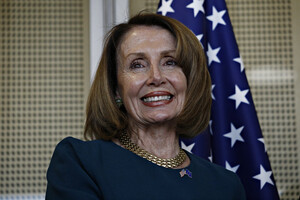The speaker of the lower house of the US Congress explained in a special article why she came to Taiwan, despite China's protest.

Approximately 43 years ago, the US Congress passed a , and President Jimmy Carter then signed the Taiwan Relations Act, one of the most important pillars of American foreign policy in the Asia-Pacific region.
The Taiwan Relations Act established America's commitment to a democratic Taiwan, providing a framework for an economic and diplomatic relationship that quickly grew into a key partnership. This contributed to a deep friendship based on common interests and values: self-determination and self-government, democracy and freedom, dignity and human rights. Speaker of the US House of Representatives Nancy Pelosi, who arrived today on a visit to Taiwan, writes about this in a special article for the Washington Post. Next, ZN.UA provides a translation of this article.
The law made a solemn pledge that the US would support Taiwan's defense: “Considering any effort to determine the future of Taiwan by non-peaceful means as a threat to the peace and security of the western Pacific region, and a serious cause for US concern.” America must remember that promise today. We must support Taiwan, which has become an island of resilience. Taiwan is a leader in governance: right now in the fight against the COVID-19 pandemic and the fight to preserve the environment, as well as in climate action. He is a leader in matters of peace, security and economic dynamics with his entrepreneurial spirit, culture of innovation and technological prowess that is the envy of the whole world.
And yet, it is alarming that this dynamic and stable democracy, recognized by Freedom House as one of the freest in the world and proudly led by a woman – President Tsai Ing-wen – is under threat. In recent years, Beijing has seriously increased the tension in relations with Taiwan. The PRC has increased patrols of bombers, fighter jets, and spy aircraft near and even over Taiwan's air defense zone, prompting the US Department of Defense to conclude that the Chinese military is “likely preparing for a possible attempt to unify Taiwan and the PRC by brute force.”
Also read: FT: China gave Pelosi's visit to Taiwan more importance than it deserves
China is also waging a battle in cyberspace, launching a large number of attacks against Taiwan's government departments every day. At the same time, Beijing is putting pressure on Taiwan's economy, forcing global corporations to cut ties with the island, intimidating countries that cooperate with Taiwan, and halting the flow of tourists from the PRC. Against the background of the increasing aggression of the Chinese Communist Party, the visit of our congressional delegation should be seen as a unanimous statement that America supports Taiwan, our democratic partner, in its self-defense and defense of its freedom.
Our visit, one of a series of congressional delegations to the island, in no way contradicts the long-standing one-China policy defined by the Taiwan Relations Act of 1979, as well as the US-China Joint Communiqué and the Six Guarantees. The US continues to oppose unilateral efforts to change the status quo. Our visit is part of a wider trip to the countries of the Pacific region, including Singapore, Malaysia, South Korea and Japan. It focuses on issues of common security, economic partnership and democratic governance. Our discussions with our Taiwanese partners will focus on reaffirming our support for the island and advancing our shared interests, including the development of a free and open Indo-Pacific region. American solidarity with Taiwan is now more important than ever, not only for the island's 23 million people, but also for the millions oppressed and threatened by the PRC.
32 years ago, I went to China as part of a bipartisan congressional delegation, where in Tiananmen Square we unfurled a black and white banner with the inscription: “For those who died for democracy in China.” The police chased us as we left the square. Since then, Beijing's appalling human rights record and disregard for the rule of law have continued. And leader Xi Jinping is holding on to power even more.
The Communist Party's brutal suppression of political freedoms and human rights in Hong Kong, where even the Catholic Cardinal Joseph Chen was arrested, resulted in the promise of “one country, two systems” being simply thrown into the dustbin. In Tibet, the Communist Party has long waged a campaign to destroy the Tibetan language, culture, religion, and identity. In the Xinjiang Uyghur Autonomous Region, Beijing is committing genocide against Uyghur Muslims and other minorities. And throughout the mainland part of the country, the Communist Party continues to persecute and arrest activists, leaders of the fight for freedom of religion and anyone who dares to challenge the regime.
Read also: “The USA showed its teeth”: Klimkin on Pelosi's visit to Taiwan< /p>
We cannot stand by while the Communist Party continues to threaten Taiwan and democracy as such. We made this trip at a time when the world faced a choice between autocracy and democracy. At a time when Russia is waging its planned illegal war against Ukraine, killing thousands of innocents, including children, it is critical that America and our allies make it clear that we will not surrender to the autocrats.
When in April I headed the Congress delegation that arrived in Kyiv, I conveyed to President Volodymyr Zelenskyi that we admire the way his people protect democracy in Ukraine and democracy as such in the whole world. With a trip to Taiwan, we honor our loyalty to democracy, we confirm that the freedom of Taiwan and all democracies must be respected.




